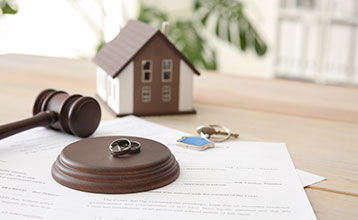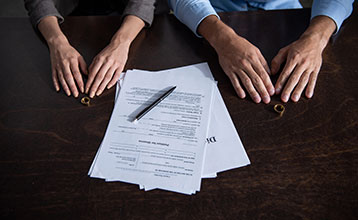An HDB flat forms a significant portion of many Singapore couples’ matrimonial assets. Couples contemplating divorce are often concerned about what would happen to their HDB flat after the divorce.
- Can one partner keep the flat?
- Do you have to sell it?
- How will you split the proceeds?
What happens to your HDB flat when you divorce will depend on several factors. The starting point is whether you and your spouse can agree on what should happen with the flat or whether the court will decide what should happen. This article will discuss the different scenarios and the factors the court will consider if the parties cannot agree on an outcome.
The parties agree on what should happen to the HDB flat after their divorce
If the spouses agree on what should happen to the HDB flat, they can record the agreed terms. The court will confirm the terms in a consent order “sealed” by the court, which will become legally binding on both parties. This is the easiest and least stressful solution.
Parties can agree to sell the flat or decide to transfer the shares to one of the parties, provided that the party is eligible to own an HDB flat. The agreement is subject to HDB’s approval.
Agree to sell the flat
The flat can be sold on the open market, and the proceeds split in an agreed proportion. CPF refunds must be made when the HDB flat is sold after the divorce.
Transfer their shares to the other spouse
If you or your spouse are eligible to take ownership of the flat, you may transfer the ownership of the HDB to one of you with or without cash transfers. If there is a mortgage on the HDB flat, the party taking over ownership must refinance the loan.
There are many benefits in transferring shares from one spouse to the other. For example, if there are children in the marriage, and the spouse who has care and control of the children keeps the HDB flat, it is less disruptive for the children. The parties can also agree on the terms of CPF refunds.
What happens if the parties cannot agree on what must happen to the HDB flat?
If the parties cannot decide what should happen with the HDB flat, the court will determine what should happen at an ancillary hearing.
The first consideration before the court is whether the HDB flat is part of the matrimonial property that can be divided upon divorce.
Is the HDB flat matrimonial property?
Although the HDB flat will most likely be a matrimonial asset, a spouse cannot claim an interest simply because they are married. To have an interest, the flat must be considered “matrimonial property” under the Women’s Charter.
Section 112 of the Women’s Charter defines matrimonial property as any asset acquired by one or both parties to the marriage during the marriage.
It can include assets acquired before the marriage, if
- the asset was ordinarily used or enjoyed by both parties, or one or more of their children whilst the parties lived together for shelter, household, recreational or social purposes; or
- the asset was substantially improved during the marriage by the other party or by both parties to the marriage.
If the HDB flat was a gift or inheritance to one of the parties before the marriage, it will not automatically become matrimonial property. The flat can, however, be included in the matrimonial asset pool if:
- the flat became the matrimonial home; or
- has been substantially improved during the marriage by the other party or both parties to the marriage.
Whether the flat was “ordinarily used as a matrimonial home” will depend on the circumstances of the case. Suppose the parties only occasionally lived in the house inherited by one of the parties before the marriage. In that case, the court might decide that it does not form part of the matrimonial property. Suppose the parties lived in the home for an extended period as a family during the marriage. In that case, the court is more likely to include the flat in the matrimonial pool.
If the flat does not fall in the matrimonial pool of assets, it will not be divided between the parties.
How will the court divide it between the parties if the HDB forms part of the matrimonial pool of assets?
The court can either order the parties to sell the property and divide the proceeds or transfer the shares to one party.
Typically, there will be an ancillary hearing where the court will listen to both parties before deciding on the division of matrimonial property. Matrimonial assets do not have to be divided equally. The court will order a just and fair division for both parties.
Sale of the flat
If the court orders the sale of the flat, the court will also decide how the sale proceeds must be divided. When determining what is just and fair, the court will consider many factors.
The factors are not exhaustive but will include factors set out in section 112(2) of the Women’s Charter.
The factors include:
- The extent of contributions by each party during the marriage This includes financial contributions or indirect contributions towards improving or maintaining the matrimonial assets. It includes non-financial contributions made towards the family’s welfare or supporting (financially or non-financially) a spouse’s carrying on of their career or business. It includes looking after the home or caring for the family or any aged relative dependent on either party.
- Any debt owing, or obligation incurred or undertaken by either party for their mutual benefit or the benefit of any child of the marriage.
- Any agreement between the parties made before the divorce concerning the ownership and division of matrimonial assets, such as a deed of separation or a prenuptial agreement.
- The needs of the children. The court will consider to whom the care and control of the children are given as well as the general welfare of the children.
- The length of the marriage and the standard of living enjoyed by the family before the divorce.
- The age and physical and mental abilities of each party.
- Any period of rent-free occupation or other benefit enjoyed by one party in the matrimonial home to the exclusion of the other party.
- Each party’s financial needs after the divorce. The court will consider the income, working ability and earning capacity that each party is likely to have in the foreseeable future. It will also consider each party’s financial obligations and responsibilities in the foreseeable future.
Transfer to one spouse
If the court considers the transfer of ownership to one of the spouses, that spouse must be eligible to own an HDB flat.
A party is eligible when:
- The party has care and control over the children and forms a family nucleus with the children; or
- The parties have no children, but the party is older than 35 years and eligible to own an HDB flat under the Single Singapore Citizen Scheme (i.e. a Singapore Citizen and the flat was purchased as resale on the open market without a CPF Housing Grant for Family); or
- If the party is under 35 years old, the party can form a family nucleus with their parents or siblings or new intended spouse, if the scheme’s eligibility requirements are met.
The party must also be able to refinance the existing mortgage loan based on that party’s sole income and make the appropriate CPF refunds or cash payments to the other party.
Surrender the flat to the HDB
If the Minimum Occupation Period (MOP) has not been met, you may be required to surrender the flat to the HDB at the prevailing compensation price. The MOP is five years for flats bought directly from the Housing and Development Board.
Surrendering the flat is the least desirable outcome since compensation from the HDB is usually lower than what you can get on the open market. However, before you reach the MOP, the parties cannot agree to sell the flat.
Can you avoid surrendering?
Yes, you can apply to the HDB for permission to sell the property on the open market before meeting the MOP requirements. Alternatively, you can enter a Deed of Separation in the meantime and wait until you reach the MOP.
If you must surrender the flat, any outstanding mortgage loans and reimbursements to CPF will be paid from the compensation. The remaining balance can be divided between the parties according to the court order.
Whether you should sell or transfer your interest in the HDB flat to your spouse will depend on your circumstances. An experienced lawyer will explain all the options to you and guide you towards the most suitable option for your circumstances.
Fixed, clear & transparent fees
$1,490
No children, property or maintenance
$2,490
With children, property and maintenance


